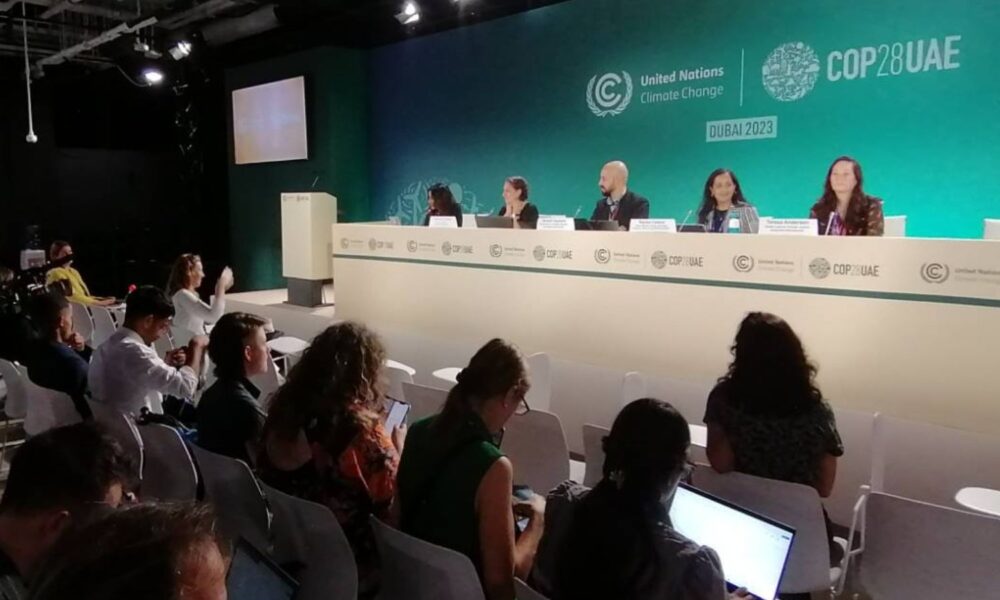While there are thousands of people here in Dubai at COP28 fighting for genuine change, the climate summit is facing a barrage of disinformation.
Combatting climate change has never been more urgent, and COP28 is poised to advance critical global action. Yet, driven by vested interests in the fossil fuel industry, misleading narratives aim to distort and hinder meaningful climate commitments. It’s important that we understand these disinformation tactics to eliminate their power.
Here I highlight three areas of disinformation outlined in a pre-COP28 report released by Climate Action Against Disinformation (CAAD), revealing the lies that could undermine global efforts to combat climate change.
Fossil fuels are the problem
It’s pretty simple: the burning of fossil fuels is the main driver of climate change.
According to The Global Carbon Project, approximately 36.6 billion tons of the 40.5 billion global carbon dioxide emissions in 2022 came from fossil fuel use.
During the lead up to COP28, I kept hearing the message that the problem is emissions, not fossil fuels. This misleading narrative tries to decouple fossil fuels from climate change. It argues that the world can reduce emissions while still burning all the fossil fuel we want in order to divert attention from the urgent need to reduce fossil fuel production and use.
Let’s be clear, evidence from the latest Intergovernmental Panel on Climate Change (IPCC) report supports the necessity for substantial reductions in fossil fuel consumption to limit global warming. Governments, including COP28 host the United Arab Emirates, acknowledge this fact. More than 100 countries want the final COP28 decision to call for a phase-out of fossil fuels.
Climate action is limited by political will (not technology)
In this pivotal moment of history, where the imperative to avert the worst impacts of climate change is clear, the world stands at the cusp of a transformative shift toward a renewable energy paradigm. The world should be focused on collective efforts towards a managed decline in existing mining and drilling sites and the cessation of new coal, oil, and gas production, not its expansion.
The 6th assessment of the IPCC was clear, and a sharp and equitable transition remains technically feasible. What’s lacking is political will. But we can alter our energy trajectory. This moment presents not only a challenge but an opportunity to reshape our energy landscape and mitigate the impending climate crisis. We just need to do it.
Oil and gas investments do not automatically increase access to energy
The numbers don’t lie. Investing in oil and gas projects does not lead to increased access to energy for populations currently struggling with energy poverty. The impact of fossil fuel dependence on African economies is starkly evident with these nations experiencing significantly slower rates of economic growth, often up to three times slower than those with diversified economies. A poignant example is Mozambique, where foreign companies, notably Eni and TotalEnergies, have injected nearly $30 billion into offshore natural-gas reserves and liquid natural gas (LNG) capacity. Despite these substantial investments, a staggering 70% of the population still lacks access to electricity.
Don’t Gas Africa is pushing back on the narrative that investment in fossil fuels is good for the surrounding area. They emphasize the urgency of scaling up cost-effective, clean, decentralized, renewable energy as the fastest and effective solution to eradicate energy exclusion and meet the needs of Africa’s diverse population.
Decoding deception is key
Understanding the deceptive tactics employed by vested interests in the fossil fuel industry can help us to navigate disinformation and emerge with clarity, especially in today’s world where these supercharged tactics spread through social media and search engines. Unfortunately, these aren’t the only disinformation tactics surrounding our work at COP28. CAAD has outlined six more tactics in their report They continue to track the climate deception to help uncover additional tactics and cases of disinformation.
By unraveling the web of deception, we bolster our chances of securing commitments for real change at COP28.

